Key takeaways:
- Building an emotional connection with the audience through personal stories and social media engagement is crucial for music band promotion.
- Regular rehearsals improve musical skills, foster team chemistry, and provide promotional material by documenting progress.
- Creating a structured rehearsal schedule and having clear goals enhance productivity and accountability within the band.
- Incorporating feedback from all members encourages growth and collaboration, ultimately leading to improved musical creativity and performance.
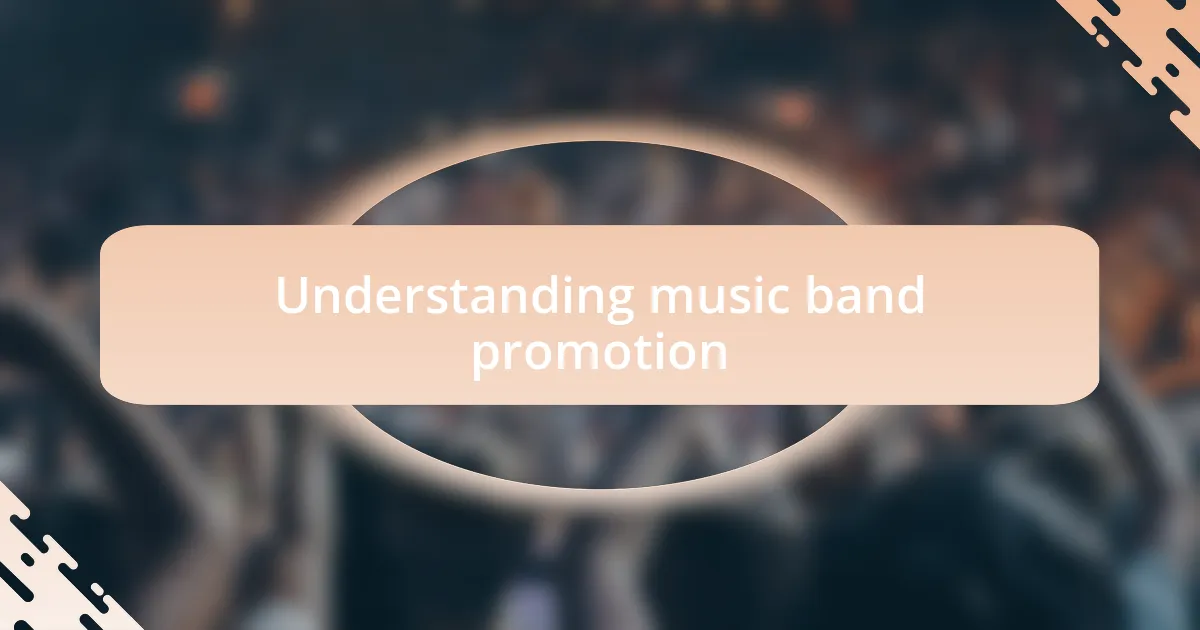
Understanding music band promotion
Understanding music band promotion goes beyond simply announcing gigs; it’s about building a connection with your audience. I remember when my own band first tried to reach out to fans. We learned that sharing our journey—behind-the-scenes moments, rehearsals, and struggles—created a deeper bond with our listeners. Have you ever felt more attracted to an artist when you glimpsed their personal story? That emotional connection is what makes a band memorable.
Moreover, effective promotion involves utilizing social media platforms creatively. I recall experimenting with different content types, from live Q&A sessions to short performance clips. Each post was an opportunity to engage with our followers, making them feel like part of our creative process. This interaction not only increased our visibility but also allowed us to receive genuine feedback. Isn’t it amazing how meaningful engagement can turn casual listeners into dedicated fans?
Finally, understanding your target audience is crucial. Early on, we spent time analyzing which demographics resonated with our music. It was fascinating to realize how different groups responded to various promotional strategies. By tailoring our approach, we not only attracted more fans but also cultivated a loyal community. Have you considered who connects with your music the most? Identifying your audience can transform your promotional efforts into a more impactful experience.
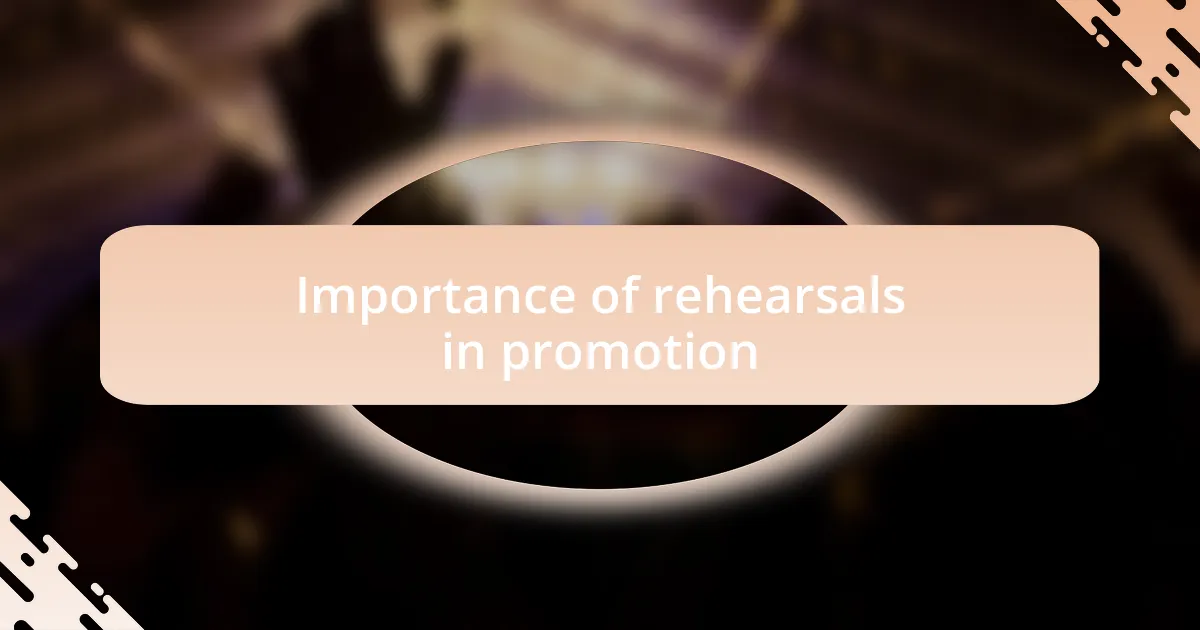
Importance of rehearsals in promotion
Rehearsals serve as the foundation for a band’s sound, and this foundation is crucial for promotion. I still remember a pivotal rehearsal where we tightened up our setlist, leading to an unforgettable performance that generated buzz in our local scene. Have you ever seen a band perform flawlessly live? That kind of energy is infectious, and it starts in the rehearsal space.
When a band rehearses regularly, they not only enhance their musical skills but also build chemistry. I’ve noticed that the more we practiced together, the more connected we felt on stage, and that connection resonated with our audience. Isn’t it fascinating how that synergy can turn a simple gig into a memorable experience for everyone involved?
Additionally, each rehearsal can be an opportunity to document progress, leading to promotional material. Last summer, we recorded snippets of our sessions and later shared those clips with our fans. This not only provided insight into our evolution as a band but also made our audience feel involved in our journey. Have you tapped into the storytelling potential of rehearsal footage? It’s a fantastic way to energize your promotional efforts.
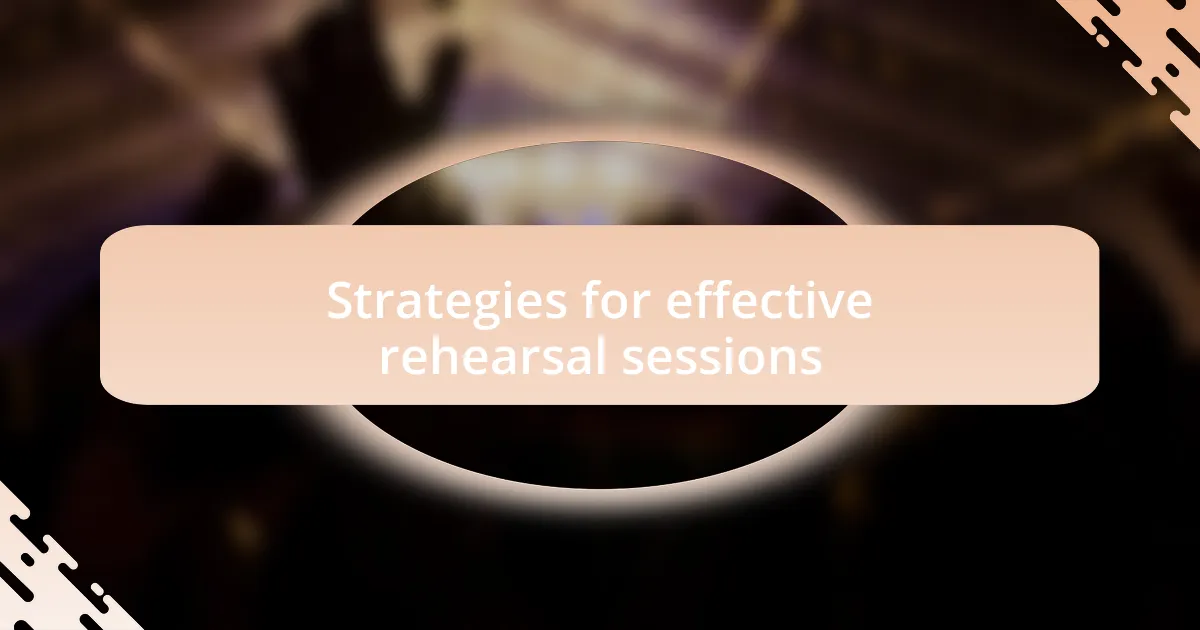
Strategies for effective rehearsal sessions
One effective strategy I’ve found is setting clear goals for each rehearsal. For instance, during our last series of practices, we focused each session on mastering one song from our setlist, which helped us identify and address specific challenges. Have you ever felt the thrill of nailing a tricky part after hours of practice? That rush keeps the momentum going.
Another technique that works wonders is mixing up the rehearsal environment. Sometimes, we would take our gear outside or to a different venue, and it transformed our dynamic. It’s amazing how a change of scenery can spark creativity, helping us discover new sounds and styles within our music. Have you ever tried this? It definitely keeps things fresh and invigorating.
Finally, fostering openness among band members about feedback is crucial. In one memorable rehearsal, we created a space where everyone could share their thoughts without fear of judgment. This honesty not only improved our sound but also deepened our trust in one another, turning us into a tight-knit group. I believe that kind of vulnerability can elevate a band’s synergy to new heights.
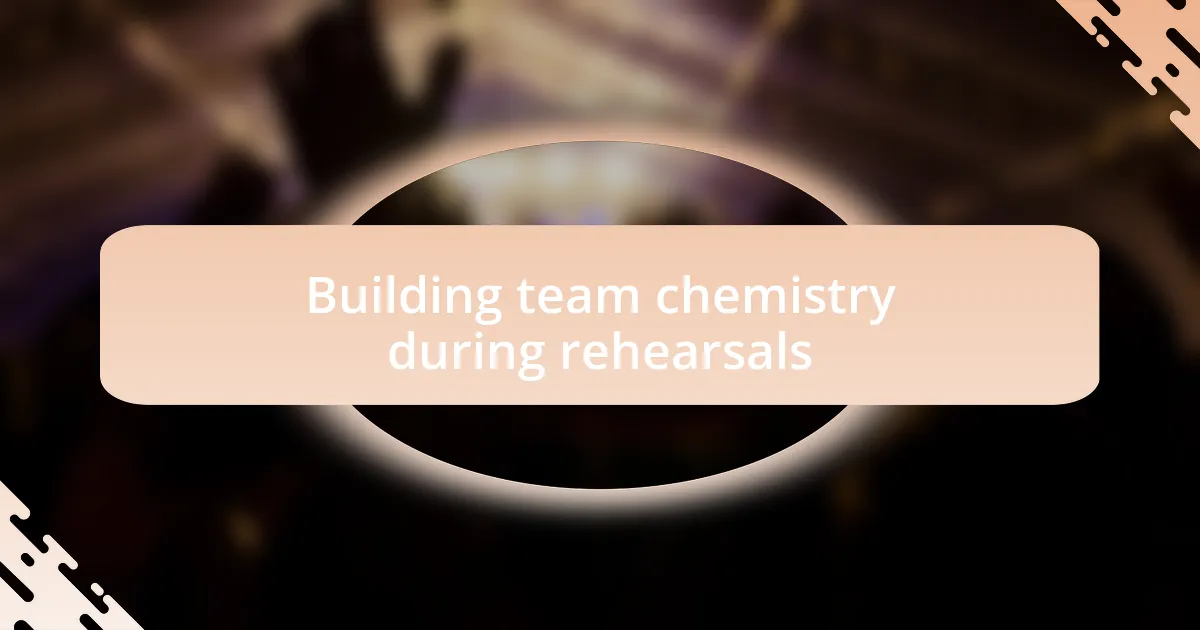
Building team chemistry during rehearsals
We often underestimate the power of simply enjoying each other’s company during rehearsals. I remember one session where we decided to kick things off with a jam session, playing our favorite cover songs. That spontaneous laughter and shared experience brought us closer, allowing us to connect not just as musicians, but as friends. Have you ever noticed how laughter can break down barriers and enhance collaboration?
One time, after a particularly intense rehearsal, we gathered for some snacks to unwind and reflect on our progress. This downtime allowed us to share our individual stories about how we got into music, which enriched our understanding of each other’s motivations and passions. It was eye-opening to realize that we all faced similar challenges on our musical journeys. Doesn’t it feel great to discover common ground that strengthens your bond?
Also, I’ve found that small gestures speak volumes when it comes to team chemistry. A simple compliment or a word of encouragement during rehearsals can work wonders. I recall a moment when one of our guitarists struggled with a solo, and the supportive cheers from the rest of us made all the difference. It reminded me how vital it is to uplift one another; after all, we’re all in this together, striving for that same goal of creating amazing music.
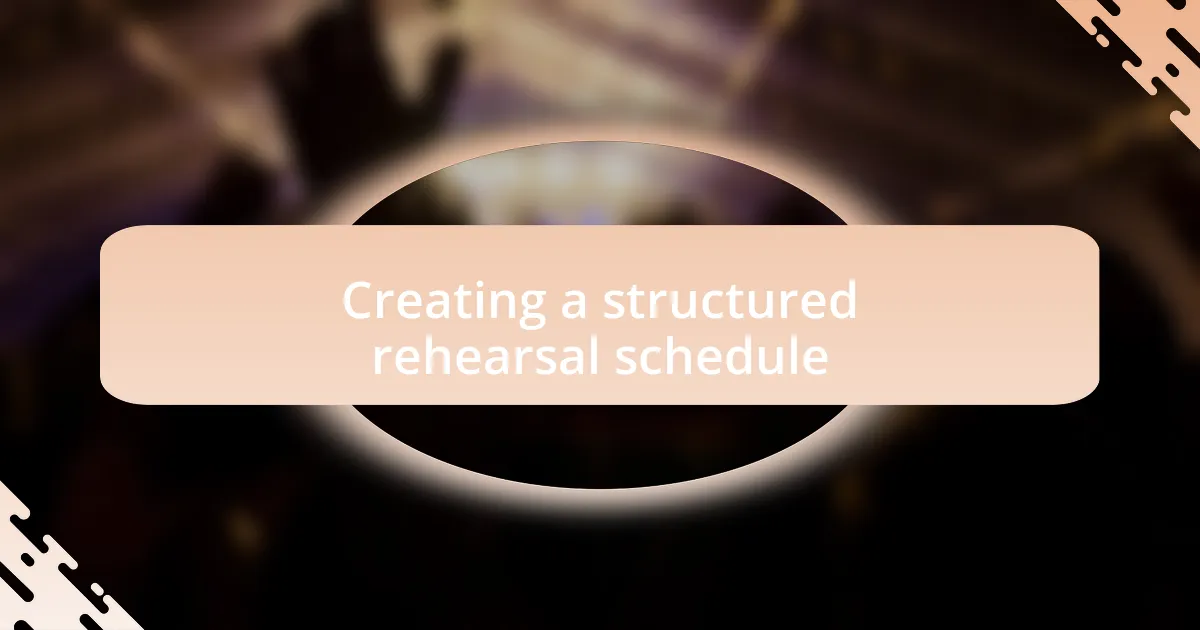
Creating a structured rehearsal schedule
Creating a structured rehearsal schedule has been a game-changer for my band. Early on, we often met haphazardly, which led to wasted time and frustration. I decided to implement a weekly schedule that earmarked specific days for songwriting, practice, and group discussions—this simple change marked a pivotal shift in our productivity and focus.
I still remember the first time we all came together with a clear agenda. Each member knew exactly what to expect and what was expected of them. I felt an undeniable energy in the room as we tackled our set list, knowing that we would be working towards clear goals. It made rehearsals not just about playing music but about progressing together as a cohesive unit.
Now, I can’t stress enough how beneficial it is to stick to this schedule. It gives us a framework to hold each other accountable. Have you ever been part of a project where lack of structure derailed the entire process? By committing to our routine, we’ve fostered a sense of responsibility, ensuring that every rehearsal counts towards our growth as a band.
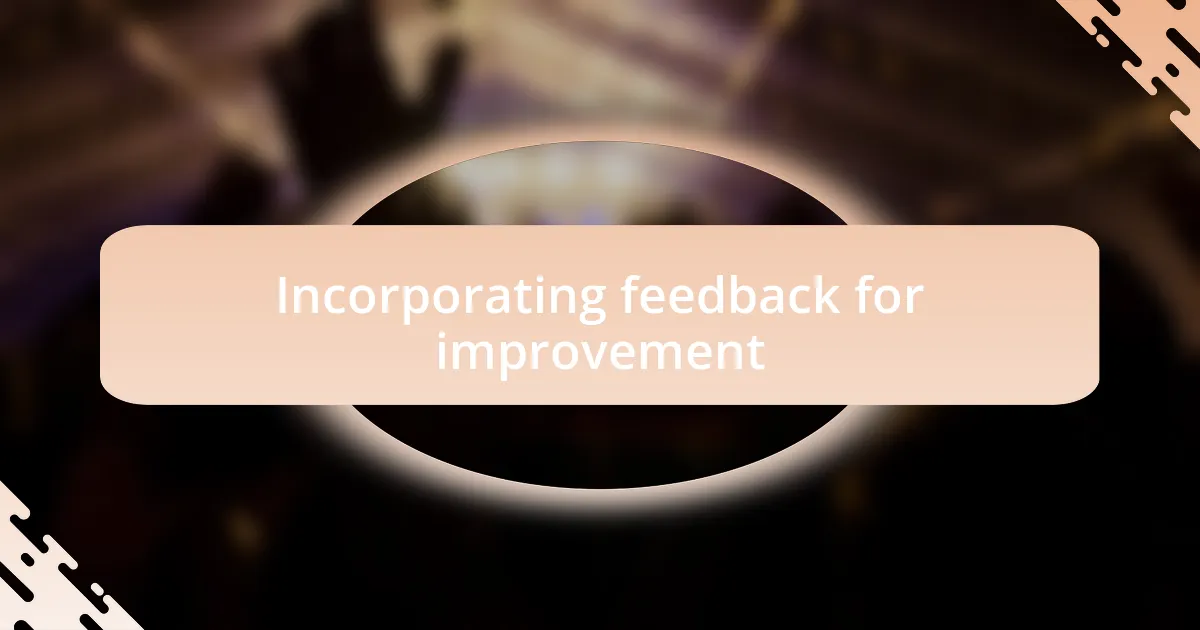
Incorporating feedback for improvement
Incorporating feedback for improvement has profoundly reshaped how we rehearse as a band. After each session, I make it a point to gather input from all members. I remember one rehearsal where a member suggested rearranging the song order, claiming it would heighten our set’s emotional impact. In that moment, I realized how vital each voice is—by integrating that feedback, we created a flow that felt more dynamic, and I could sense the excitement from the audience we were imagining.
Feedback isn’t just about criticism—it’s about growth and collaboration. I once received a pointed suggestion that my guitar solos lacked a bit of spontaneity. At first, it stung, but then I took a step back and saw the opportunity it presented. By embracing that perspective, I started experimenting more during rehearsals, adding unexpected flourishes. The thrill of pushing my limits reminded me that sometimes, improvement stems from discomfort.
Listening to diverse perspectives can boost creativity in ways you’d least expect. I still think back to a moment when a drummer in our band pointed out that my lyrics didn’t quite match the song’s energy. Initially taken aback, I later realized that he was right. I sat down and reworked certain lines, infusing them with a livelier spirit. This not only enhanced the song but also deepened the sense of camaraderie; it showed that we’re all invested in each other’s success and the music we create together.
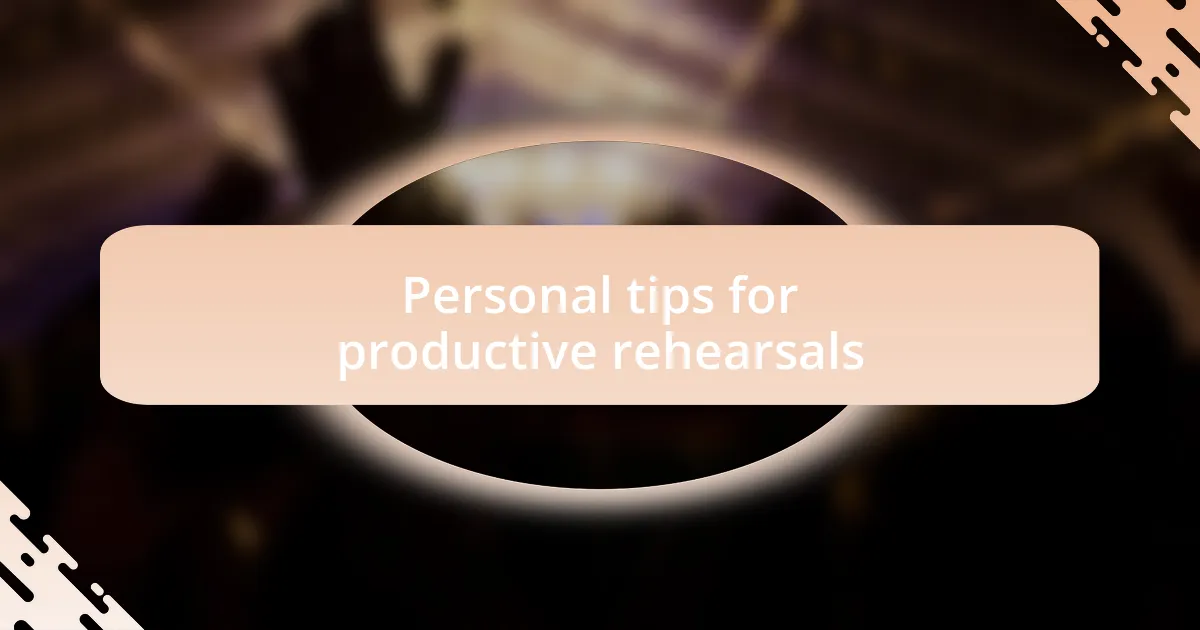
Personal tips for productive rehearsals
One of my personal tips for productive rehearsals is to come prepared with specific goals in mind. I’ve found that when I walk in knowing what I want to achieve—be it perfecting a tricky section of a song or nailing the harmonies—I’m more focused. Have you ever noticed how much smoother a session can go when everyone shares a common target? It creates a sense of purpose and urgency.
I also believe in the power of setting a positive rehearsal environment. There was a time when our group had a few off-days, and the atmosphere turned a bit tense. It dawned on me that we needed to lighten things up, so I started incorporating some warm-up games that got everyone laughing. That simple change lifted our spirits and reminded us why we love making music together.
Lastly, I can’t stress enough the importance of taking breaks during longer rehearsals. I used to push through, thinking it would save time, but I realized we were all losing focus. When I began scheduling short breaks, I saw a remarkable difference in energy and creativity afterward. It’s incredible how stepping away—even for five minutes—can clear your mind and spark new ideas. Have you tried this approach? It might just transform your next rehearsal.